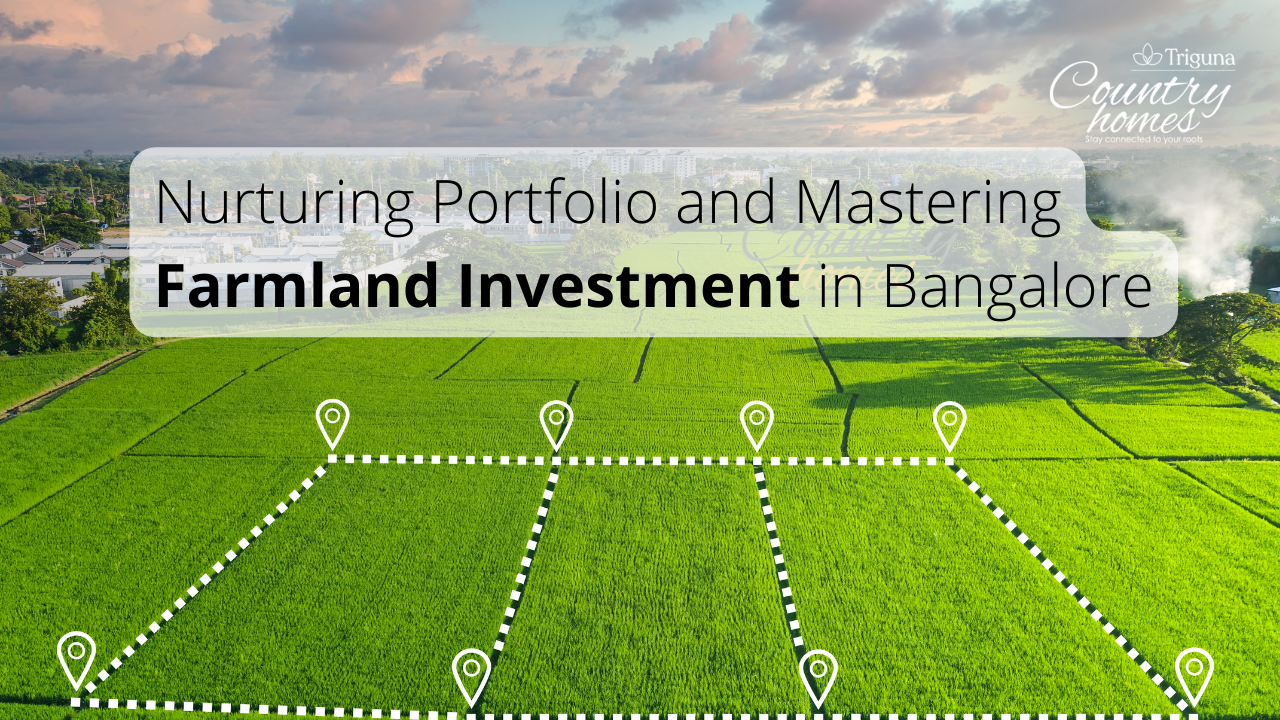Investing in Bangalore’s farmland presents a unique opportunity to diversify and nurture your portfolio. More than just financial gains, farmland investments provide a blend of growth and protection for your assets. In recent years, particularly in the post-COVID era, there has been a remarkable surge in demand for farmlands and farmhouses in India. This surge can be attributed to the growing awareness, especially in metropolitan areas, of the benefits of living amidst nature. People are increasingly willing to invest in experiences that bring them closer to the natural environment. Farmland investment, viewed not as an expense but as a strategic investment, allows you to cultivate both your portfolio and a healthy lifestyle. Discover the art of shortlisting farmland options to capitalize on this trend and enhance your investment portfolio.
How Farmland Investment Grows and Protects:
- Steady Appreciation:
Farmland has historically demonstrated steady appreciation, with values consistently increasing over the years. According to Economic Times, “Over the past decade, the value of an acre in Ramavarapadu, near Vijayawada, surged from Rs 7 lakh to Rs 7 crore. Similarly, in Mardi, 15 km from Solapur, Maharashtra, the price per acre, according to local resident Prakash Arjun Kate, soared from Rs 20,000-25,000 to Rs 10 lakh.” This aggressive growth trajectory makes farmland an attractive long-term investment option, providing investors with a reliable avenue for capital appreciation.
- Inflation Hedge:
Farmland serves as a natural hedge against inflation due to its intrinsic link to essential resources. As inflation erodes the value of currency, the tangible nature of farmland, coupled with its production of vital commodities, preserves and enhances its value. Renowned investor Jim Rogers affirms this, stating, “If you want to preserve wealth, you could not do better than farmland.”
- Income Generation:
Investing in farmland allows for the leverage of agricultural activities, translating into regular income streams. The cultivation of crops, livestock, or leasing the land for agricultural purposes can generate a consistent cash flow. This income diversification enhances the overall financial performance of the investment, offering a dual benefit of both appreciation and income.
- Portfolio Diversification:
Farmland provides a unique avenue for portfolio diversification, reducing overall risk exposure. As per Farmtogether, “Not only is farmland uncorrelated to other major asset classes such as stocks, bonds or real estate, but it offers investors the benefit of lower volatility and attractive returns.”Including farmland in a diversified investment portfolio can enhance risk-adjusted returns and provide stability during economic fluctuations.
- Environmental Stewardship:
Investing in farmland aligns with sustainable practices, contributing to environmental conservation. Sustainable farming practices not only enhance the long-term productivity of the land but also resonate with the growing demand for eco-friendly investments. As environmental awareness increases, farmland investments offer investors the opportunity to participate in ethical and environmentally responsible wealth creation.
Finding Reliable Farmland Developers:
When choosing a farmland developer in Bangalore, several critical factors should be carefully evaluated to ensure a successful and rewarding investment. Here’s a detailed exploration of these factors:
Reputation and Track Record:
- Investigate the developer’s reputation in the real estate and farmland market.
- Analyze their track record by reviewing past projects, ensuring successful execution and timely delivery.
Regulatory Approvals and Compliance:
- Verify that the developer has obtained all necessary regulatory approvals from local authorities.
- Ensure compliance with land-use regulations, zoning laws, and environmental norms.
Transparency and Documentation:
- Look for a developer who provides clear and transparent documentation, including all legal aspects, terms, and conditions.
- Understand the transparency in the project’s pricing, payment plans, and any associated costs.
Financial Stability:
- Assess the financial stability of the developer, as this influences the project’s progress and completion.
- Check for partnerships with reputed financial institutions, indicating credibility.
Location and Accessibility:
- Evaluate the location of the farmland in terms of accessibility, proximity to essential amenities, and future growth prospects.
- Consider the ease of reaching the farmland from major transportation hubs.
Infrastructure Development:
- Examine the infrastructure development planned around the farmland, as this can significantly impact its value and livability.
- Assess the quality of internal roads, water supply, and other essential amenities.
Amenities and Facilities:
- Look for developers offering modern amenities such as wellness centers, sports facilities, and community spaces.
- Evaluate the quality and maintenance of existing amenities in their previous projects.
Customer Reviews and Testimonials:
- Seek feedback from previous clients to understand their experiences with the developer.
- Online reviews and testimonials provide insights into the developer’s reliability, responsiveness, and after-sales service.
Budget and Payment Plans:
- Examine the developer’s pricing strategy and payment plans to ensure they align with your financial capabilities.
- Be clear about any additional costs or hidden charges associated with the purchase.
Environmental Considerations:
- Assess the environmental sustainability practices implemented by the developer, ensuring alignment with eco-friendly standards.
- Check for measures taken to preserve natural resources and promote biodiversity.
Water Availability and Land Quality:
- Confirm the availability of water resources for irrigation and other needs on the farmland.
- Evaluate the soil quality and topography to understand its suitability for farming or construction.
Construction Guidelines:
- Understand the construction guidelines and restrictions imposed by the developer or local authorities.
- Ensure clarity on what can be built on the farmland and any limitations regarding structures.
When looking out to invest in farmland, Consider investing in Triguna Country Homes for a perfect fusion of rural tranquility and urban conveniences, complete with essential amenities. Strategically located just 45 minutes from Electronic City, this project encompasses over 100 acres, adorned with a lush green belt featuring more than 100,000 fully grown trees. The picturesque setting might just entice you to call it home. Adding to its allure, the project boasts a scenic 7-acre natural lake, inviting you to indulge in swimming, coracle rides, or the timeless joy of playing paper boats with your children. The project also provides construction guidelines, water management solutions, and optimal soil quality to enhance the overall benefits of your investment. A visit to Triguna Country Homes is sure to evoke a sense of nostalgia.


